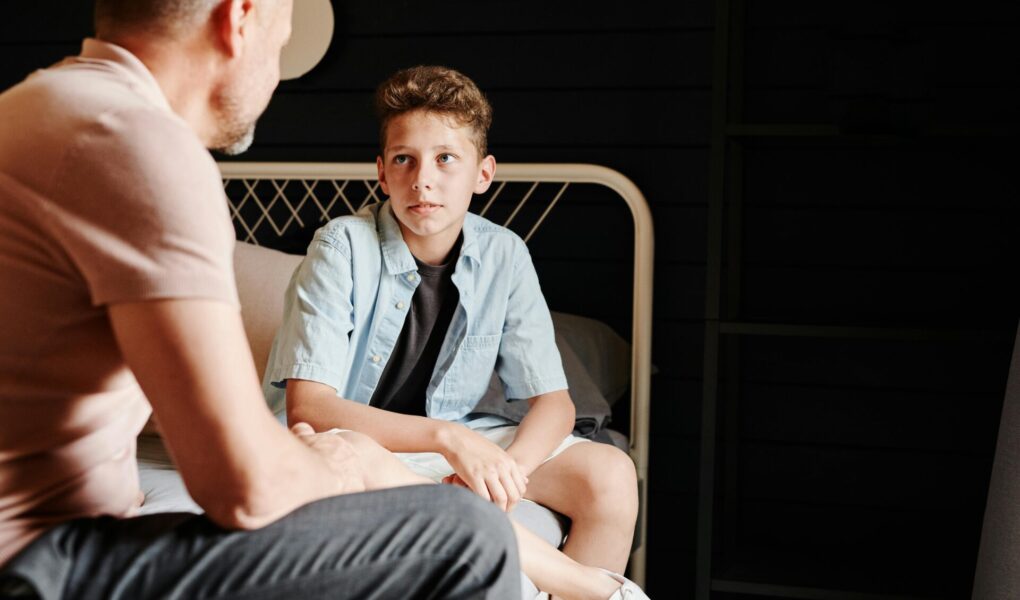When kids enter middle school, it feels like they are entering a whole new world (No Aladdin pun intended, lol) because that’s exactly what happens. Everything is completely different. They make new friendships while losing old ones. Puberty makes its grand entrance. Friendship dynamics become more complex, school becomes more fast-paced, and responsibilities begin to pile up.
This is a time of significant growth, making it essential for children to receive guidance from their parents–even if they think they don’t need help because they “know everything” and view their parents as stuck in the “olden days”.
That’s why it’s crucial to have these important conversations with your middle schooler now, to ensure they stay on the right path.
8 Conversations to have with your middle schooler today
1. Bullying/Cyber Bullying
StopBullying.gov says that “Bullying is most frequently reported in grades six through eight. In 2019, about 28% of 6th-, 7th-, and 8th- graders reported being bullied at school during the school year”.
To put these numbers into perspective, let’s say a middle school has 1,050 students. That means that 294 students are experiencing bullying. This is a big number…and a huge problem.
Talk to your kids about bullying and cyberbullying. Stay up to date on what’s going on in their social media, cell phones, and with their friends at school. Have an open conversation on what type of behaviors and comments are appropriate. Most of all, make sure your door is always open without judgment for them to come to you if they are in trouble or when they have a question.
Oftentimes, kids who experience bullying do not come to their parents because they are embarrassed to admit that someone has been bullying them. Let them know that if they are ever in this situation, they do not need to suffer in silence or feel shame. This is a terrible thing that is happening to them and you can help them make it better.
On the other hand, you also need to make it clear that they should never bully anyone, as this is inappropriate behavior and causes a lot of damage to the victim. If you learn that your child has engaged in bullying, then you need to take the necessary steps to correct it.
For more information on Bullying prevention and information on bullying, visit stopbullying.gov. They are an amazing resource for parents and students.
2. Peer Pressure

Remember when we were growing up and our parents used to say “If your friends jump off a cliff, are you going to jump too?” I think this is the most used phrase of all time but it was spot on. Peer pressure has always been an issue for kids, as the need to fit in can be very strong. No one wants to stand out or look “boring” in front of their friends, making it one of the primary reasons why kids engage in risky or bad behaviors.
Peer pressure becomes especially prominent for middle schoolers since they are trying to fit in with their peers. Everything is changing so fast. What once was cool in Elementary school, no longer applies since that was for “little kids”.
Talk to your middle schooler about peer pressure and how to stay true to themselves. Ask them about what kind of things kids are doing in school that make them feel uncomfortable, and offer to help if they don’t know how to handle uncomfortable situations.
Related: How To Build Your Child’s Confidence, The Right Way
Use this moment to talk about the importance of having good associations. Point out how good friends will encourage them to reach their goals and pursue good friendships. On the other hand, bad friends will encourage them to engage in bad activities such as drugs, alcohol, getting into physical fights, and even joining gangs. This will only land them into trouble that could have repercussions for the rest of their lives. So, it is very important that they choose their friends wisely.
3. The right way to handle conflict
This will highly depend on your personal views about conflict. However, a good starting point is to teach them to be respectful and kind to others. If they have a disagreement with a classmate, teach them how to communicate effectively to try to resolve the issue.
Always remind them that physical altercations are never the answer and to try to avoid disagreements from escalating into a physical fight. No one should be putting their hands on each other.
There will be times when the best course of action is to agree to disagree if you just can’t see eye to eye. They must understand that this is ok too. They do not have to agree with everything someone else says, nor other people will always agree with their opinion on a matter.
Related: How To Effectively Manage Children Conflict Resolution
4. What to do if a physical fight breaks out
Hopefully, your child will never find themselves in this position, but you still need to have this conversation with your child. This is another point that will depend on your personal views on physical altercations. Your middle schooler needs to have a clear understanding of what to do if they find themselves in this situation.
Many parents advise their children to get away in order to avoid physical confrontation. Other parents’ advice is to never be the one to throw the first punch, but that they should defend themselves if someone puts their hands on them. Ultimately, every parent’s view will be determined by their personal beliefs.
In the end, it would be best if you always taught your children that violence is never the answer.
5. The sex talk

If you haven’t done so already, it’s time to have the sex talk with your middle schooler. The hallways of a middle school are filled with preteen/teen bouncing hormones as they are all entering puberty. The topic will certainly come up and some kids may begin to engage in sexual activities.
Talk to your child about sexually transmitted diseases, pregnancy, and safe sex practices. This does not mean that you would be encouraging your child to engage in any sexual activity. You are educating them about the risks and the responsibilities that come with this adult decision.
PubMed on The National Library of Medicine says “Data show that 5-20% of sixth graders and 14-42% of eighth graders have engaged in sexual intercourse”.
You may have thought that your middle schooler is still too young to engage in any sexual activity, but as you can see, by middle school, kids already start experimenting sexually. This study only provided information on the percentage of middle schoolers that had intercourse. But sexual activity is broader than just penetration. Sexual activity includes: kissing, sexual touching or exploration, oral sex, sexting, etc.
Make time to sit down with your middle schooler to discuss these topics. Don’t be embarrassed, explain things clearly, and answer any questions your child may have.
6. Talk about consent
Alongside the sex talk, it is imperative that you also talk about consent. Your middle schooler MUST learn that no means no and that even if a yes was initially given, the other person reserves the right to stop at any time. Even if they feel that this is a “mood killer”, they have to respect it and stop.
Talk to your child about the repercussions that may follow if they choose to ignore the other person’s request to not continue.
Do not skip this conversation.
If you are stuck and don’t know how to get this conversation started, click here for a step-by-step guide on how to tackle this talk. It is mainly addressed to boys, but the points discussed apply to girls as well.
7. Drugs and alcohol
This is a very slippery slope that kids usually never realize how dangerous it can be. They might just see it as something fun to do with their friends. Perhaps they are having problems at school or struggling with mental illness. Drugs and alcohol may seem like a fun escape that’ll help them feel better and have a good time.
They may also receive a lot of pressure from their friends to join them in drinking, smoking, or doing drugs. Many children end up joining because they don’t want to be the odd one out or simply because they want to try it and see how it feels.
Have an open conversation with your child about the dangers of drugs and alcohol. Discuss how it can affect their health, personal relationships, and their lives.
8. Social media

Oh, social media, where all drama is born and delivered at school! *sigh*
You wouldn’t believe all the problems that start because of a post, or a comment someone made. We live in a digital era, therefore making it incredibly important that we teach our kids how to use social media responsibly.
Teach your child that words are powerful and have meaning. Not to leave offensive or crude comments under someone’s post. To think twice before posting an embarrassing picture of a friend or classmate, and to not use it to threaten anyone, not even as a joke.
Make time to sit with your child and talk about their social media. Stay up to date with what they are posting and their comments. This will be instrumental in ensuring your child is not engaging in damaging behavior.
In conclusion
Having all of these conversations can seem like a daunting task. And the truth is, that it is a lot to cover. However, you do not need to cover it all in one sitting. Take your time. Tackle 1 or 2 topics per conversation. It is important that you do not rush it and ask your middle schooler questions.
Make sure to listen to their opinion and clarify any doubts they may have. Create an environment where they feel comfortable expressing themselves freely. By doing this, you’ll be better equipped to help your child stay on the right path.




